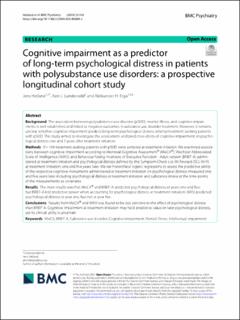| dc.contributor.author | Hetland, Jens | |
| dc.contributor.author | Lundervold, Astri J. | |
| dc.contributor.author | Erga, Aleksander Hagen | |
| dc.date.accessioned | 2024-04-02T13:36:28Z | |
| dc.date.available | 2024-04-02T13:36:28Z | |
| dc.date.created | 2024-03-06T13:43:42Z | |
| dc.date.issued | 2024 | |
| dc.identifier.issn | 1471-244X | |
| dc.identifier.uri | https://hdl.handle.net/11250/3124496 | |
| dc.description.abstract | Background: The association between polysubstance use disorder (pSUD), mental illness, and cognitive impairments is well established and linked to negative outcomes in substance use disorder treatment. However, it remains unclear whether cognitive impairment predicts long-term psychological distress among treatment seeking patients with pSUD. This study aimed to investigate the associations and predictive ability of cognitive impairment on psychological distress one and 5 years after treatment initiation.
Methods: N = 164 treatment seeking patients with pSUD were sampled at treatment initiation. We examined associations between cognitive impairment according to Montreal Cognitive Assessment® (MoCA®), Wechsler Abbreviated Scale of Intelligence (WASI), and Behaviour Rating Inventory of Executive Function - Adult version (BRIEF-A) administered at treatment initiation and psychological distress defined by the Symptom Check List-90-Revised (SCL-90-R) at treatment initiation, one and five years later. We ran hierarchical logistic regressions to assess the predictive ability of the respective cognitive instruments administered at treatment initiation on psychological distress measured one and five years later including psychological distress at treatment initiation and substance intake at the time-points of the measurements as covariates.
Results: The main results was that MoCA® and BRIEF-A predicted psychological distress at years one and five, but BRIEF-A lost predictive power when accounting for psychological distress at treatment initiation. WASI predicted psychological distress at year one, but not at year five.
Conclusions: Results from MoCA® and WASI was found to be less sensitive to the effect of psychological distress than BRIEF-A. Cognitive impairment at treatment initiation may hold predictive value on later psychological distress, yet its clinical utility is uncertain. | en_US |
| dc.language.iso | eng | en_US |
| dc.publisher | BMC | en_US |
| dc.rights | Navngivelse 4.0 Internasjonal | * |
| dc.rights.uri | http://creativecommons.org/licenses/by/4.0/deed.no | * |
| dc.title | Cognitive impairment as a predictor of long-term psychological distress in patients with polysubstance use disorders: a prospective longitudinal cohort study | en_US |
| dc.type | Journal article | en_US |
| dc.type | Peer reviewed | en_US |
| dc.description.version | publishedVersion | en_US |
| dc.rights.holder | Copyright 2024 the authors | en_US |
| dc.source.articlenumber | 143 | en_US |
| cristin.ispublished | true | |
| cristin.fulltext | original | |
| cristin.qualitycode | 2 | |
| dc.identifier.doi | 10.1186/s12888-024-05600-x | |
| dc.identifier.cristin | 2252433 | |
| dc.source.journal | BMC Psychiatry | en_US |
| dc.identifier.citation | BMC Psychiatry. 2024, 24, 143. | en_US |
| dc.source.volume | 24 | en_US |

